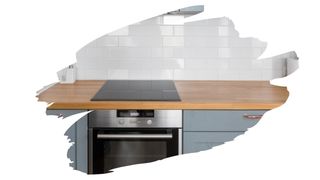You’re probably no stranger to Birch wood. This North American hardwood is one of the more abundant, durable, and affordable hardwoods you can work with.
Often used for the manufacture of Plywood, this sturdy lumber can also be found in cabinetry, moldings, and even butcher blocks.
And then there’s Rubberwood. Contrary to some misconceptions, this lumber is very solid and dense. In fact, Rubberwood is about as tough as other popular lumbers, such as Teak wood and Walnut.
But Rubberwood isn’t the first thing that comes to mind when you think of a rustic countertop. Yet, how does it compared with Birch wood?
Well, in this post, you will learn why wood needs to be more than just tough in order to survive the environment of a kitchen. You’ll also learn precisely how strong both Birch wood and Rubber wood are — and what this means for their scratch-resistance.
And keep reading to discover which affordable hardwood is the best choice for your kitchen countertop (hint: its neither Birch or Rubberwood).

This post may contain affiliate links to products that we receive a commission for (at no additional cost to you). Learn more here.
What Is The Best Wood For A Kitchen Counter Top?
Very tough scratch-resistant woods are always your best option. Even better, are tough timbers that also have natural rot-resistant characteristics.
So, while Hard Maple Wood is a popular and affordable countertop choice, it isn’t rot-resistant. Teak wood, on the other hand, is much more expensive. Although not as hard as maple, Teak’s wood preserving tree oils lend it natural moisture-resistance.
But, White Oak, is a great compromise between the two. It is more affordable than Teak, and as tough as Hard Maple. Plus, White Oak has pore-stopping Tyloses that help to prevent it from absorbing moisture.
Related Post: Is White Oak Good For Making Durable Outdoor Furniture?
What About Birch? Is Birch A Good Choice For Countertops?
While Birch wood is a little less tough than Hard Maple, it is still durable. It would take a lot of force to make a deep scratch in this North American hardwood.
Nevertheless, like Hard Maple, Birch wood is not rot-resistant. And it is susceptible to wood bugs too.
So, while it is an affordable choice for interior furniture, it isn’t the most decay-resistant one either. Especially if it’s placed in a high-steam/moisture environment such as a kitchen.
OK. So What Is The Most Durable Scratch Resistant Wood For A Kitchen Countertop?
Well, the harder the lumber, the more scratch-resistant it will be. And any natural characteristics that can help prevent wood from absorbing moisture, is a plus as well.
What’s more, not only can tough wood types shrug off scratches, they also deter wood bugs too.
So, if price is no option, then tropical hardwoods such as Rosewood, Ebony, and Teak wood are all great choices. But, like most imported tropical woods, these lumbers are all fairly expensive (especially Rosewood, since it is so rare).
What About Rubber Wood? Is It Even Solid Enough To Become A Countertop?
Rubberwood timber is very solid. Contrary to the material made from it’s latex extract, Rubberwood tree lumber is almost as tough as say Teak wood.
So you can use Rubberwood for making interior furniture and cabinetry. But, fair warning, this wood does not have the most high quality feel to it.
Due to its large open pores, Rubberwood surfaces can feel rough to the touch — even through layers of wood finish.
Related Post: What Is Rubberwood (And Does It Make Good Furniture?)
What About Birch? Does Birch Dent Or Scratch Easily?
Not at all, far from it. You’ll have your work cut out trying to dent this North American hardwood.
In fact, according to Birch woods Janka rating, it’s one of the tougher North American hardwoods out there.
The Janka rating of wood is one way to measure how much force it takes to crush a piece of timber. The bigger the Janka rating, the harder and tougher the wood.
Rubberwoods Janka rating is around 960 lbf. Which means you’ll need to lean in with 960 pounds of force to scratch the surface of this timber.
On the other hand, Yellow Birch, clocks in at 1260 lbf. And Sweet Birch is even tougher, checking in at a surprisingly solid 1470 lbf.
Now, having said all that, this doesn’t mean that Rubberwood isn’t also durable. So long as you’ve properly sealed it, Rubberwood can still last decades with the right care.
Isn’t Rubberwood A Tropical Wood? Why Is It So Cheap? It’s because Rubberwood is grown mainly for it’s latex. While the timber of this tree is an after thought.
Is Rubberwood Waterproof (Or At Least More Rot Resistant Than Birch)?
Rubberwood is not. Unfortunately, it doesn’t have any water-resisting characteristics about it, and it’s not rot-resistant.
So it is susceptible to wood rot if exposed to a lot of moisture/humidity. Which is why you would not want to use this wood for outdoor structures or garden furniture.
What’s more, there are certain rooms in your home that Rubberwood won’t last in…namely the kitchen.
You see, an everyday kitchen is filled with steam, spills, and splash-back. And a kitchen countertop made from Rubberwood will have to endure all three on a daily basis.
And if that’s the case, even a well sealed and finished Rubberwood countertop can soon begin to show evidence of rot.
Related Post: Rotting Wood Around Your Sink? 3 Ways To Protect That Wooden Worktop
However, that’s not to say natural solid Birch wood would fair much better.
The smallest crack in the seal of a Birch wood countertop can mean water will seep into it. And Birch wood is just as bad (if not worse) when it comes to readily rotting due to water-damage.
So What Is The Best Material To Make a Countertop Out Of?
If your choices are limited to Birch or Rubberwood, then save your money. Both of these woods will need to be properly and wholly sealed to prevent decay.
Plus you would need to be careful about making sure that seal isn’t damaged in anyway. Otherwise, this could store up problems for you later down the line.
That’s why you’re better off opting for a tough wood that is also naturally rot-resistant, such as White Oak.
White Oak countertops will also need to be properly sealed too. However any water, (that manages to seep past White Oaks finishing seal), won’t be as damaging.
To Wrap Up, Here Are The 3 Key Takeaways From This Post…
- 1). Rubberwood is a solid hardwood. It can be used to make interior furniture and other items. It’s susceptible to rot, and is not suited to high humidity/moisture areas in your home, such as the kitchen.
- 2). Birch wood is a tough durable North American hardwood. However, it also is not rot-resistant. And that makes it far from being the best option for a kitchen countertop.
- 3). Hard durable woods, that are also naturally rot-resistant, are better options for kitchen countertops. So, wood types such as White Oak and Teak wood, are great choices.
References:
Sulaiman, O., et al. “Effect of sanding on surface roughness of rubberwood.” Journal of materials processing technology 209.8 (2009): 3949-3955.
Nazarpour, Forough, et al. “Evaluation of biological pretreatment of rubberwood with white rot fungi for enzymatic hydrolysis.” Materials 6.5 (2013): 2059-2073.

